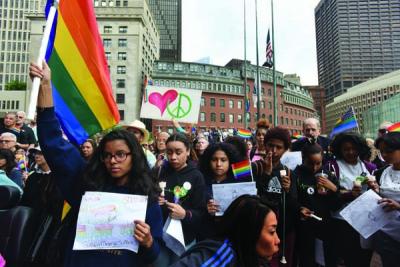June 22, 2016
 Orlando vigil: Bostonians gathered on City Hall Plaza on June 13 for a vigil in memory of the victims of the Pulse nightclub shooting in Orlando. Forty-nine innocent people were killed by a gunman armed with an assault rifle. Photo by Isabel Leon/Mayor’s Office
Orlando vigil: Bostonians gathered on City Hall Plaza on June 13 for a vigil in memory of the victims of the Pulse nightclub shooting in Orlando. Forty-nine innocent people were killed by a gunman armed with an assault rifle. Photo by Isabel Leon/Mayor’s Office
Two weeks ago, on June 12, 2016, one of the deadliest mass shootings in modern US history left 49 people dead and another 53 wounded in a gay nightclub in Orlando, Florida. Most of the victims were Latino gay men. In the days following this massacre, elected officials and members of the media debated whether this was an act of terror or a hate crime. From all appearances, it was both. The killer professed his allegiance to ISIS and other terror groups. Mental illness may have also been a factor, as well as possible same-sex attraction and internalized self-hatred on the part of the killer.
What to make of all this? We think there are two important points to be made: first, there is a broader context of anti-LGBT political activism occurring in Florida and other states, most of them in the South. Second, we must think of how we can make military-style guns less readily available in our society.
The Orlando massacre did not occur in isolation. Since the 1970s, in Florida and elsewhere (remember Anita Bryant?), anti-gay activists and lawmakers have promoted legislation that legalizes discrimination and demonizes gay people. In recent years anti-LGBT laws have repealed municipal nondiscrimination ordinances and legalized discrimination in health care and other services under the guise of “religious liberty” for social conservatives. In the first two months of 2016 alone, nearly 200 anti-LGBT bills were filed in 32 states.
A Florida law signed last March allows individuals to deny “services, accommodations, facilities, goods, or privileges for [same-sex couples] if such action would violate sincerely held religious beliefs.” Laws passed this spring in Mississippi and Tennessee allow medical and mental health providers to deny care to LGBT individuals and same-sex couples.
Acts of violence are committed against LGBT people every single day. Nationwide, transgender women and gay men, especially blacks and Latino/as, are at increased risk of hate-motivated violence. Every year in the US approximately 20 LGBT people are killed and 2,000 violently attacked in bias crimes. The nasty political debates evoked by the wave of anti-LGBT legislation sweeping the country do not help reduce this violence; instead, they enable and may appear to legitimate it. They may also contribute to internalized self-hatred. Of 88 bias-motivated homicides of LGBT people reported from 2012 to 2015, 53 percent of these homicides were fatal shootings.
Recent terror attacks in Boston, France, Britain, and Israel make it tragically clear that terrorists don’t need guns to kill — they will also build crude homemade bombs and use knives and cars to kill innocents. While common sense policies toward military-style guns will not solve jihadi-inspired terrorism, it is reasonable to ask whether more sensible policies may have prevented the Orlando terrorist from assembling his arsenal.
The day following the attack, the American Medical Association adopted a policy calling for a comprehensive national response to the public health threat posed by gun violence. The organization, at its annual meeting, also resolved to call on Congress to overturn the ban it placed on the Centers for Disease Control, prohibiting it from researching gun violence.
Eight days after the attack, the US Senate blocked four proposed gun-related amendments to a spending bill. These proposals included: strengthening federal background checks, expanding background checks to include gun show and internet sales, creating a 72-hour window to prove a potential buyer is on a watch or no-fly list, and barring any individual on a terrorism watch list from purchasing a firearm.
The mass murder of LGBT people in Orlando has made many LGBT people feel unsafe in gay bars and nightclubs — institutions that have served as refuges from a homophobic world. Just as the historic black parish in Charleston, South Carolina, rebuilt a sense of safety in its place of worship after the act of terror committed there a year ago, so, too, will the LGBT community of Orlando. We must look at policies we can enact that will make it harder for would-be terrorists and mass murderers to obtain military-style guns. Americans are not even safe from mass gun attacks in elementary schools, in churches and Jewish community centers, on college campuses, on military bases, and in the workplace. It’s time we broke the stranglehold the National Rifle Association has on our democracy and passed common sense gun regulations in our country.
Sean Cahill and Sophia Geffen are co-authors of “The Current Wave of Anti-LGBT Legislation: Historical context and implications for LGBT Health,” published June 16, 2016 by The Fenway Institute.


